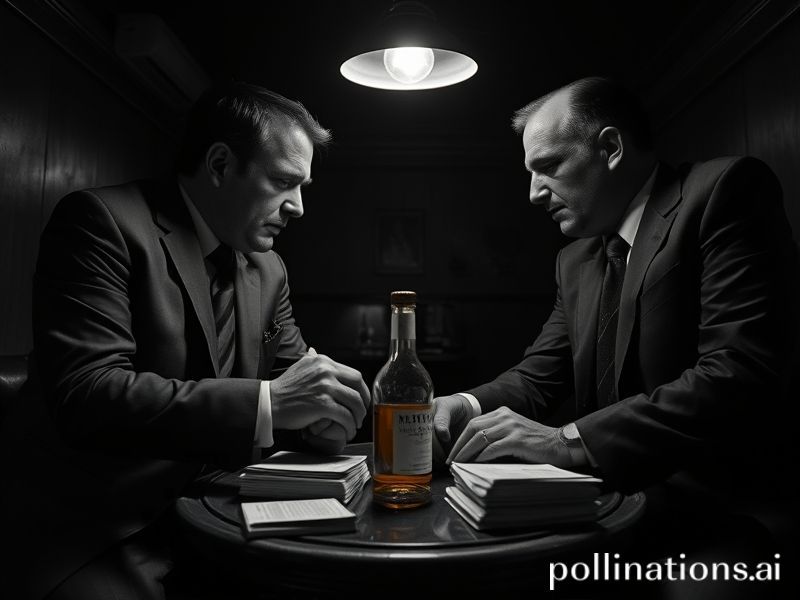Global Parlay: How the World Talks Its Way to the Brink (and Sometimes Back)
PARLAY: THE WORLD’S FAVORITE HIGH-STAKES CONVERSATION
When the French coined “parler” they merely wanted to talk; when pirates hijacked it into “parlay,” they weaponised chit-chat into a temporary cease-fire so they could haggle over doubloons and throats. Today the term has metastasised across every time zone, a linguistic stowaway riding globalisation’s rum barrel. From hedge-fund war rooms in Singapore to the fluorescent backrooms of COP summits, parlay is the polite fiction that allows adversaries to pretend they’re still civilised while calculating how much of the other side they can carve off without starting a shooting war—or worse, a Twitter pile-on.
Consider last month’s grain corridor talks in Istanbul. Ukrainian and Russian delegates arrived with the pinched smiles of divorcees dividing wedding china, knowing every wheat futures trader in Chicago was licking screens in real time. Their parlay, brokered by Turkey’s Erdogan (who negotiates like a carpet salesman sensing a tourist’s credit limit), kept the breadbaskets of half the planet from becoming collateral damage. The whole spectacle was streamed live; traders on the Dalian Commodity Exchange placed bets on whether the cease-fire would hold longer than a TikTok dance trend. Spoiler: it did, by exactly eleven hours—long enough for wheat futures to dip 3 % and for 4.2 million people to afford breakfast again. Progress, measured in croissants and cynicism.
Yet parlay isn’t reserved for the geopolitical elite. Venture capitalists in Nairobi pitch “parlay rounds,” where seed money snowballs into later-stage funding as long as founders promise not to embezzle more than 15 % before Series C. In Lagos, WhatsApp group admins parlay internet outages into collective bargaining with ISPs, threatening to migrate en masse to Elon’s satellite circus unless someone reboots the submarine cable. Meanwhile, in Silicon Valley, executives parlay congressional subpoenas into book deals—nothing monetises regret like a well-timed apology tour, preferably with a Netflix tie-in.
The darker joke is that parlay works best when everyone tacitly agrees to ignore the bill. Take the current debt-ceiling kabuki in Washington: Republicans parlay fiscal responsibility for campaign clips, Democrats parlay social programmes for likes, and bondholders in Tokyo quietly parlay their anxiety into yet another round of carry-trade sushi. The global economy keeps spinning because the alternative—admitting the IOU tower might topple—is still more terrifying than pretending compound interest is a renewable resource.
Climate negotiations are the masterclass. Every year delegates fly to whichever city hasn’t yet sunk, parlay over canapés about carbon budgets they intend to miss, then issue communiqués with all the binding power of a karaoke lyric. The real action happens in side rooms where Brazilian ranchers swap soy futures for EU green-tech subsidies, and Saudi Aramco lobbyists parlay future drilling rights into glossy brochures of futuristic mirage cities. Net result: atmospheric CO₂ rises another 2.7 ppm, but the hors d’oeuvres were locally sourced—so, growth.
Still, we persist in believing parlay is preferable to its grim cousins—sanctions, sorties, or subtweets. In Seoul, North and South officers meet weekly in a concrete hut bisected by the DMZ. They parlay with the resigned politeness of flatmates arguing over fridge space, knowing full well that one misplaced pronoun could vaporise the peninsula. The ritual is so choreographed that reporters now rate performances like Olympic figure skating: “South scored 8.5 for restraint after Northern delegate accused them of microwave theft.” Even nuclear brinkmanship has become content.
Perhaps the true international significance of parlay is that it’s humanity’s collective coping mechanism: a linguistic fig leaf allowing us to pretend that talking still beats shooting, that tomorrow’s tab is negotiable, and that the house—this pale blue dot—won’t eventually call in our marker. Until then, we shuffle deck chairs on the Titanic and compliment the band. After all, the music is lovely, and the drinks are still free—for now.







